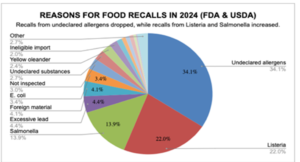Based on the recently released recall data for 2024 more people in the United States got sick from pathogens than the year before. Foodborne illness outbreaks caused by Listeria, Salmonella, and E. coli were up over 40% in comparison to 2023.
It appears that Listeria was a predominant pathogen in causing illnesses. This is different than in prior years. Historically Salmonella is responsible for most of the illnesses and recalls in terms of biological food safety hazards.
 Some of the Listeria recalls in 2024 were high profile with the largest one being Boars Head. The high number of other listeria related recalls could be the USDA’s response to Boars Head that included intensified verification testing in other facilities. Especially if the food was intended for institutional use such as school lunch programs. Allergen recalls are at a steady level, which fluctuate from year to year but usually stay between 32 and 38%. In 2024 there were fewer recalls related to undeclared allergens than in 2023. There were significantly more recalls related to Lead (Heavy metal) last year than prior years with cinnamon and apple juice concentrate as two major sources.
Some of the Listeria recalls in 2024 were high profile with the largest one being Boars Head. The high number of other listeria related recalls could be the USDA’s response to Boars Head that included intensified verification testing in other facilities. Especially if the food was intended for institutional use such as school lunch programs. Allergen recalls are at a steady level, which fluctuate from year to year but usually stay between 32 and 38%. In 2024 there were fewer recalls related to undeclared allergens than in 2023. There were significantly more recalls related to Lead (Heavy metal) last year than prior years with cinnamon and apple juice concentrate as two major sources.
The 2024 recall data summary will likely be used by regulatory agencies to adjust the way they conduct inspections or investigations to ensure your food safety systems are adequate. The likely shift will be to focus on your controls ensuring the pathogens and biological hazards are being properly controlled. If it comes to biological hazards your controls include the process controls (CCPs) and Sanitation Controls with Environmental Monitoring Programs. Of course, pre-requisite programs such as preventive maintenance of equipment and structures or procedures to commission new equipment are important. Poorly maintained facilities or equipment that pools water and collects debris could be important components that must be considered in ensuring a safe and sanitary environment in your food facility. Rusty spots on your equipment will make it impossible to clean. Bacteria can penetrate porous surfaces, and your cleaning process will be ineffective.
Both agencies (USDA and FDA) will continue to conduct their regulatory inspections. As a business you will need to demonstrate compliance with relevant legislation and that the controls you applied in your operation are effective.
At BD Food Safety Consultants LLC our team of professionals assists our clients with FDA and USDA regulatory compliance and during regulatory inspections. Whether you need a solid review and assessment of your food safety system or need help with food safety plan development please reach out via our website – https://bdfoodsafety.com/contact-us/ or call 815-641-6404.
